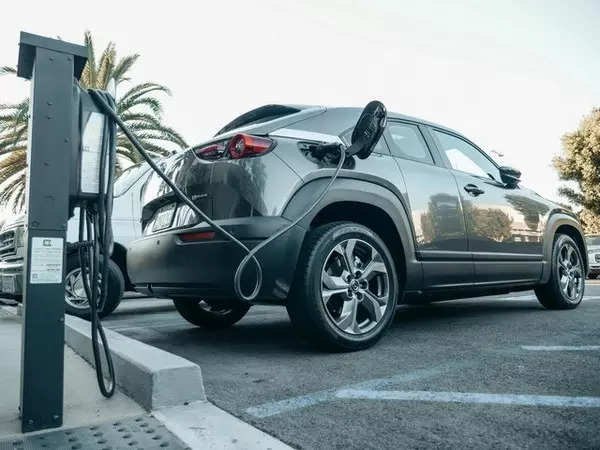
India’s fight against climate change extends beyond lofty goals. The EV30@30 initiative, aiming for a 30% share of electric vehicles (EVs) in new sales by 2030, presents a transformative opportunity. Transitioning to EVs isn’t just about cleaner air; it’s a strategic move to secure a leadership position in the transportation revolution. With fossil fuels taking a backseat, electricity has become the new oil. This shift unlocks economic prosperity by fostering a robust domestic EV ecosystem, reducing dependence on imported oil, and boosting energy security.
The Burning Need for Change
Transportation is a major source of India’s environmental woes, contributing 12% of energy-related CO2 emissions and heavily polluting urban areas. With the demand for mobility projected to double by 2050, addressing this issue is critical. While long-haul heavy-duty transport electrification is still evolving, EVs are proving highly effective for short-distance freight, significantly curbing emissions.
India’s EV Market: Ready to Shift Gears
The Indian EV market is electrifying, with a significant surge in sales. Between May 2023 and May 2024, India saw a substantial increase, reaching a total of 1,666,172 units sold. This steady growth started in May 2023 with 158,459 units and peaked in March 2024 with 212,829 units sold. Notably, the penetration of electric two-wheelers witnessed a jump from 4% in April 2024 to 5% in May 2024, indicating a growing preference for sustainable mobility solutions. This surge signifies a growing acceptance and popularity of EVs. While the current market share remains modest, it’s a signpost, not a setback, pointing towards the immense potential of EVs to transform India’s transportation landscape.
However, challenges persist. Commercial EV adoption faces a significant hurdle: a dearth of choices, especially for heavy-duty vehicles. This, coupled with the high upfront costs compared to traditional gas-powered commercial vehicles and an inadequate charging infrastructure network geared primarily towards passenger EVs, is hindering widespread adoption.
India’s Strategic Advantage for a Sustainable Ride
While established markets dominate current EV sales, India is demonstrating promising signs. Electric two- and three-wheeler sales are witnessing significant growth, indicating a burgeoning domestic demand for sustainable mobility solutions. The government’s recent USD 3.2 billion incentive program, coupled with rising private sector investments, is expected to significantly accelerate battery manufacturing and EV rollout in the coming years.
By leveraging this momentum and strategically addressing challenges, India can capitalize on the global EV wave and establish itself as a key player in the sustainable transportation revolution.
Combining Strengths: Roadmap to EV30@30
Awareness and Education: To accelerate EV adoption and unlock their full potential, a multi-pronged approach is needed. Targeted awareness campaigns can educate key sectors like e-commerce, FMCG, and pharma, highlighting the combined benefits of EVs: lower operating costs, reduced emissions, and improved efficiency. Beyond these benefits, smart electric vehicles, equipped with data analytics, can optimize delivery routes, minimize idle time, and streamline fleet management – leading to faster deliveries and reduced energy consumption. Additionally, the data collected by these smart EVs provides valuable insights into driver behavior, vehicle performance, and energy usage patterns. This empowers companies to make informed decisions regarding fleet optimization, maintenance scheduling, and infrastructure development for charging networks.
Supportive Policies and Regulations: A comprehensive policy framework can propel EV adoption by offering financial incentives like tax breaks and subsidies to make EVs more affordable, targeting light commercial vehicles for their economic impact, and encouraging rooftop solar installations to create a sustainable charging infrastructure.
Private Sector Investments and Collaborations: Public-private partnerships between OEMs, charging infrastructure providers, logistics fleet companies, and energy companies are crucial for boosting the EV ecosystem.
Scale Up EV Production and Manufacturing: To foster a robust domestic EV ecosystem, incentives are crucial for manufacturing a wide range of electric vehicles across various form factors, including medium and light commercial vehicles. This approach will not only reduce dependence on imports but also achieve cost parity with internal combustion engine (ICE) vehicles by catering to a broader market spectrum.
Achieving EV30@30 requires a united effort from all stakeholders. The government, the private sector, and the public must work together. The private sector can drive investments, collaborate on public transport electrification, and support EV adoption in commercial sectors. The government can enact supportive policies, create awareness campaigns, integrate EVs into public transportation, and develop targeted programs for rural areas.
The EV30@30 roadmap is not just a vision; it’s a feasible plan for a more prosperous India. By addressing key challenges, scaling up production and adoption, and integrating EVs into various sectors, India can become a global EV leader, driving economic growth, job creation, and a significant reduction in greenhouse gas emissions. The successful implementation of this roadmap hinges on collaboration, paving the way for a sustainable and eco-friendly future for India.

